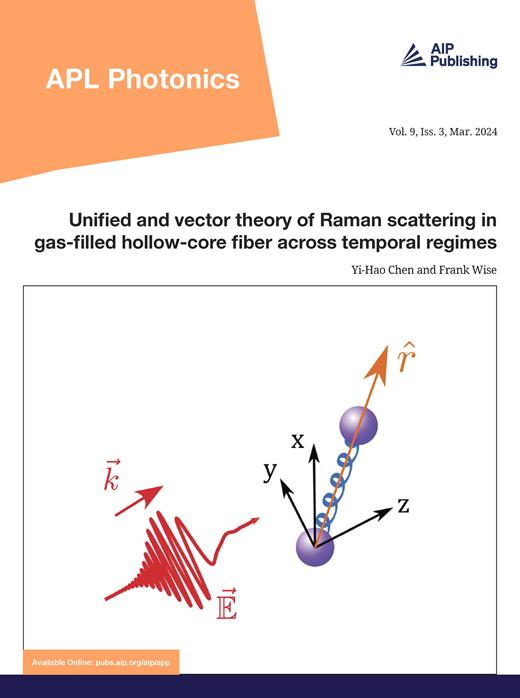具有多模激励的光纤放大器中的横模不稳定性理论
IF 5.3
1区 物理与天体物理
Q1 OPTICS
引用次数: 0
摘要
动态非线性热光散射产生的横向模式不稳定性(TMI)是限制大功率光纤激光器和放大器功率扩展的主要因素。有人提出,可以通过激发高度多模光纤中的多个模式来抑制横模不稳定性。我们推导出了一种半解析频域理论,即在一般光纤几何结构下,窄带光纤放大器在任意多模输入激励下发生 TMI 的阈值。我们的详细模型包括增益饱和、泵浦耗尽和随模增益的影响。我们的研究表明,TMI 是由于热光耦合导致所有模式的噪声在下移频率下呈指数增长。每个模式中的噪声增长率是由各种模式中的信号功率之和按成对的热光耦合系数加权得出的。我们计算了标准圆形多模光纤中所有 ∼104 对模的热光耦合系数,结果表明,横向空间频率失配较大的模式耦合较弱,从而形成带状耦合矩阵。这种短程行为归因于热传播的扩散性质,它介导了耦合,并导致多模激发时的噪声增长率低于单模,从而显著抑制了 TMI。我们发现 TMI 阈值与渐近激发的模式数量成线性比例,从而使 82 模式光纤放大器的 TMI 阈值提高了大约一个数量级。本文章由计算机程序翻译,如有差异,请以英文原文为准。
Theory of transverse mode instability in fiber amplifiers with multimode excitations
Transverse Mode Instability (TMI) that results from dynamic nonlinear thermo-optical scattering is the primary limitation to power scaling in high-power fiber lasers and amplifiers. It has been proposed that TMI can be suppressed by exciting multiple modes in a highly multimode fiber. We derive a semi-analytic frequency-domain theory of the threshold for the onset of TMI in narrowband fiber amplifiers under arbitrary multimode input excitation for general fiber geometries. Our detailed model includes the effect of gain saturation, pump depletion, and mode-dependent gain. We show that TMI results from the exponential growth of noise in all the modes at downshifted frequencies due to the thermo-optical coupling. The noise growth rate in each mode is given by the sum of signal powers in various modes weighted by pairwise thermo-optical coupling coefficients. We calculate thermo-optical coupling coefficients for all ∼104 pairs of modes in a standard circular multimode fiber and show that modes with large transverse spatial frequency mismatch are weakly coupled, resulting in a banded coupling matrix. This short-range behavior is due to the diffusive nature of the heat propagation, which mediates the coupling and leads to a lower noise growth rate upon multimode excitation compared to a single mode, resulting in significant TMI suppression. We find that the TMI threshold scales linearly with the number of modes that are excited asymptotically, leading to roughly an order of magnitude increase in the TMI threshold in an 82-mode fiber amplifier.
求助全文
通过发布文献求助,成功后即可免费获取论文全文。
去求助
来源期刊

APL Photonics
Physics and Astronomy-Atomic and Molecular Physics, and Optics
CiteScore
10.30
自引率
3.60%
发文量
107
审稿时长
19 weeks
期刊介绍:
APL Photonics is the new dedicated home for open access multidisciplinary research from and for the photonics community. The journal publishes fundamental and applied results that significantly advance the knowledge in photonics across physics, chemistry, biology and materials science.
 求助内容:
求助内容: 应助结果提醒方式:
应助结果提醒方式:


